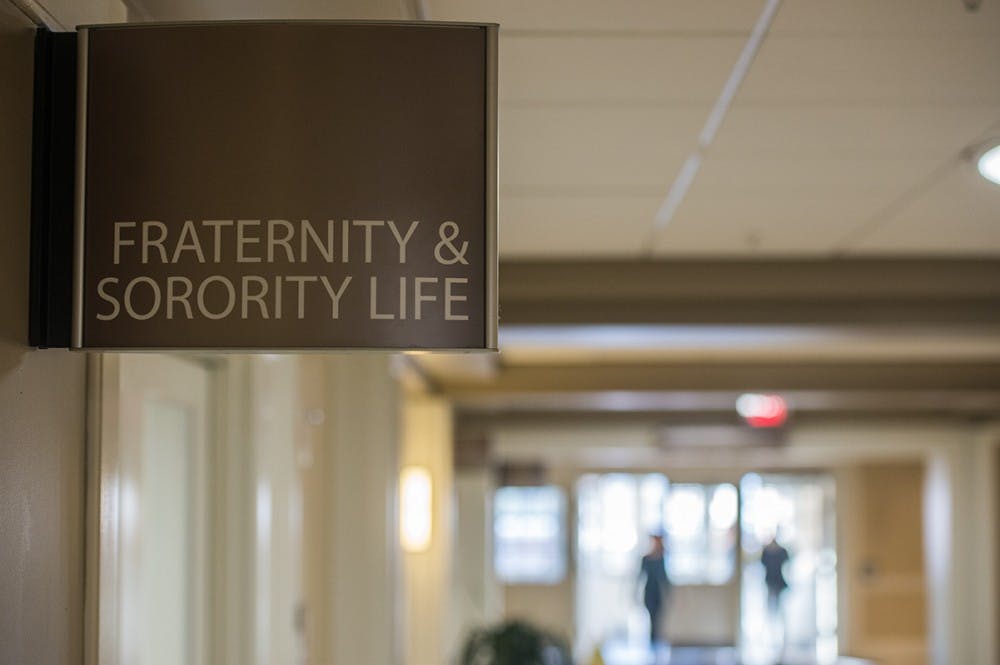The University suspended Latina sorority Sigma Lambda Upsilon last March for allegedly violating the University’s hazing policy after a new member complained to a professor about pledging for the sorority while a student in their class. Nearly one year later, the organization remains suspended by the University.
SLU — also known as Señoritas Latinas Unidas — filed a federal lawsuit against U.Va. in September, claiming the University incorrectly identified a requirement to study 25 hours per week as a “serious hazing activity.” Several University officials — including Pat Lampkin, Vice President and Chief Student Affairs Officer, Hal Turner, Asst. Dean and Director of Fraternity and Sorority Life and FSL Program Coordinator Caroline Ott — were named as defendants in the amended lawsuit, which was submitted Jan. 2.
Information obtained from the University in an open records request by The Cavalier Daily indicates additional details about the sorority’s recruitment process that led U.Va. to suspend the organization. According to the Office of the Dean of Students’ hazing complaint from March, new members were expected to spend more than 50 hours per week with the sorority, to stay on Grounds for spring break without being told why and to stand and stare at a fixed point on a wall for unreasonable amounts of time, as well as studying 25 hours per week, as noted in the lawsuit.
“SLU new members were enduring physical, emotional, and mental stress directly as a result of many aspects of the SLU New Member Process,” the complaint reads.
The University’s Hazing Evaluation Panel determined the professor’s report — which was received by the Office of the Dean of Students Feb. 14, 2018 — was credible and notified law enforcement and the Commonwealth’s Attorney for the City of Charlottesville.
The records also indicate that Turner and Ott met with the sorority to discuss the new member process and the requirements to pledge — including studying 25 hours per week, spending 12 hours per day on weekends learning about the sorority and attending the sorority’s national conference in New York during spring break. The report states that new members were not informed of the spring break trip because it was intended as a surprise.
New members indicated in meetings with FSL that they were each issued a daily schedule based on their academics and were “assigned SLU project time, structured study time, structured eating time and time that must be spent with sisters.” The report adds that new members were expected to all dress in similar attire, such as a certain color scheme every day.
“All new members expressed emotional stress as a result of struggling to meet the time demands of the SLU new member process,” the report reads. “New members also expressed sentiments of feeling supported by the chapter.”
Under University policy, hazing is defined as an action taken or situation created by a student organization or athletic team toward members or prospective members occuring on University-owned or leased property or at University-sponsored functions that “is designed to produce or does produce mental or physical harassment, humiliation, fatigue, degradation, ridicule, shock, or injury.”
Examples of hazing the University lists in its policy include forced excursions, confinement, servitude, verbal abuse, forced consumption of any substance and sleep deprivation. Hazing is a Class 1 misdemeanor in Virginia.
“Based on the evidence obtained from written statements, and an evaluation of the perceived credibility of the relevant Sigma Lambda Upsilon witnesses, the investigators do find Sigma Lambda Upsilon responsible for violating the University’s hazing policy,” the report concludes.
The University spokesperson did not return a request for comment on the “perceived credibility” of the sorority mentioned in the report.
The sorority will remain suspended until they provide Fraternity and Sorority Life staff with a copy of all updated governing documents, including new member education plans and guidelines from the national headquarters.
SLU currently lists an anti-hazing policy on the membership interest page of its website, which states the organization “does not condone and will not tolerate the hazing in any manner.”
“Our new member education program is intended to foster and embody sisterhood,” the policy continues.
Isabel Argoti, the National Director of Public Relations at SLU, did not respond to a request for comment.
The University temporarily sanctioned and suspended four Greek organizations for policy violations in 2018, including the Phi Kappa Psi fraternity for allegedly forcing alcohol consumption and head-butting during recruitment, the Alpha Chi Omega sorority for allegedly forcing drinking and the Lambda Phi Epsilon fraternity for allegedly encouraging sex, alcohol consumption, pranks or physical activity as part of the new-member process. All of these organizations — with the exception of SLU — have been able to resolve the complaints.







